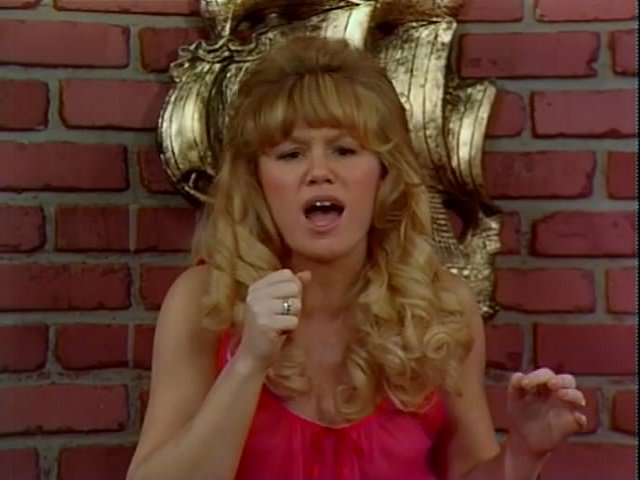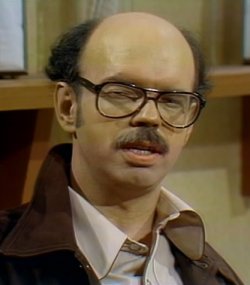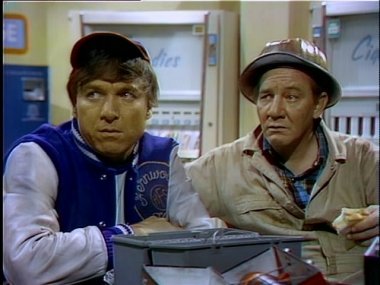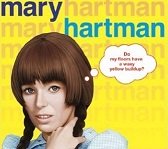Episode 2
Air Date:
1/6/76
Synopsis:
Mary goes to the police station to pick up a family member in trouble. Cathy talks to her mother, Martha, about a new love. Mary breaks some bad news to the rest of the family. And Mary and Tom's problems in bed continue.

Review and Commentary:
The second episode of MH2 is nowhere near as explosive as the first, but it is very funny. It also establishes the halting pace of storytelling in MH2, which was directly inspired by the soaps it set out to satirize. Not all that much happens, beyond Mary picking up Grandpa from jail, where she meets Sergeant Dennis Foley in person for the first time.1
You might notice in the opening scene, Mary identifies herself by repeating her name, a la the series title, "Mary Hartman, Mary Hartman". There seems to have been an attempt at this stage to work this into the dialogue whenever possible, but if it was meant to be a running gag, it was discarded pretty early on.
Grampa's character here is pretty different from who he soon evolved into, a gentle man with an open mind and a lot of common sense, usually a voice of reason in the unbalanced Shumway/Hartman family. Here, he's mostly just angry, maybe due to the circumstance of being arrested for flashing, but still, it was jarring for me after seeing the whole series to go back and see this early, unformed version of Grampa. It's strongly implied that Grampa doesn't even remember committing the act, indicating some degree of early dementia, a cliche which never became a prominent facet of his character.
This episode has the first of Loretta's original Country Western songs, one in spectacularly bad taste inspired by the murder of the Lombardi family, and of course, their goats and chickens. We first hear it sung by Charlie at the auto plant, to a horrified George and Tom. The lyrics:
They call me the engineer
and I'm riding the train to heaven.
I got a mother, a father,
and a chicken, and a goat,
riding the train to heaven.
"It's from the murderer's point of view, but you don't know it till the end," Charlie explains helpfully, while Tom and George just stare at him in utter disbelief.


This is quintessential MH2 humor. There's no real "joke" here, but if you're lucky enough to have a sense of humor on the same wavelength, you'll find it just as funny as a good one liner can be.
Another big first in this episode is our introduction to Martha, played by the utterly unique, irreplaceable Dody Goodman. Martha is a sort of modern spin on the Gracie Allen type, a ditz with only a dim awareness of reality, who has a southern drawl thicker than cold molasses and a totally offbeat manner of delivering lines. Martha has an outward exuberance even when she's upset that is the polar opposite of Mary's usual deadpan vacancy, but still, they feel like a believable mother-daughter pair.
Cathy, on the other hand, seems like she was beamed in from another planet as she tells her mother about the latest of her many, many, many, MANY love affairs.
CATHY: [talking about her new boyfriend] He's so soulful. . .
MARTHA: Soulful? I don't like the sound of that. He's not black, is he?
CATHY: No, mother, he's Armenian.
MARTHA: He could be a black Armenian.
I don't expect to dwell on this in the future, but I'll say it now: I consider Debralee Scott somewhat of a weak link in the show. I don't mean to be harsh; I don't actively dislike her. She has charm and screen presence, and she's very pretty and perky, but she's also by far the weakest actor in the core cast, constantly flubbing her line readings and displaying very little emotional range. That doesn't stop her from often being very funny, or her storylines from being interesting. But I consider her acting a drag on the show at times, something I wouldn't say of any other adult cast member.
The scene where Mary tells the Shumways about Grampa's arrest is the first of what will become an MH2 tradition: scenes where she has to find a way to break very, very bad news to someone. She's not very good at it, and somehow only gets worse as the series progresses.
We get our first glimpse into the Haggers living room, a disaster area that immediately gets across that Loretta is not your standard model traditional house wife. She's a good hearted, warm, open person, but far from without faults. She's much too "friendly" for her own good, shown here to be oblivious to the effect she has on men as she parades around in a skimpy Frederik's of Hollywood nightie before a stupefied reporter. We also get a taste of her self obsessed nature: she assumes the reporter is there to interview her about her burgeoning show biz career, and launches into no end of details about it that he has no interest in hearing; he's there to get her reaction to the Lombardi murders.
That doesn't stop Loretta from demonstrating "Riding the Train to Heaven" for him, to a reaction equally as horrified as George and Tom's when Charlie sang it. There's an odd note, given the direction the show will take Loretta's character, in that Mary Kay Place seems to be aiming for comedy through purposely amateurish singing, with some squawked notes as bad as any sounds Jack Benny produced on his violin. As with angry Grampa, this is an element of her character that was apparently reconsidered quickly. Personally, I hate Country Western music, yet I find MKP's singing throughout the series legitimately great. Never again would her singing talent be presented as worthy of ridicule—although her frequently tacky lyrics continue to be a source of abundant humor throughout the series.
The episode concludes with Mary and Tom in bed. Tom remains a tool. Unable to admit he has a problem getting it up, he continues to place all the blame on her when all she's trying to do (or rather, not do) is exactly what he asked of her. The closeup on Tom at the end reveals to us not only that he's aware of how full of crap he is, but also how good an actor Mullavey is to be able to rescue Tom from full blown audience hatred. Unfortunately for Mary, while we can see the pain on Tom's face, he's already turned away from her, leaving her to stew in her insecurities totally bewildered.
It's sometimes hard to separate the excellent performance of Greg Mullavey from the generally despicable character he's playing, but I think the producers cast the perfect actor for this part. He plays Tom with a naturalism and reality that only method actors achieve, so effective at embodying the character that he seems (falsely) to be simply playing himself. Adding to the overall effect is his boyish stature, which perfectly matches the childish behavior his character so often exhibits. Mullavey's tendency to repeat his lines sometimes irritates me, but he's a great match for Lasser, and they make a completely believable married couple. Their scenes together contain many of the greatest dramatic moments in the series, as intense a depiction of a marriage in decay as anything in Ingmar Bergman's Scenes from a Marriage.
While not as exciting plot-wise as the first episode, I find this one no less entertaining or interesting. This is not a series with a plot that moves at a breakneck pace, which is fitting considering the pacing of soaps at the time. It's fascinating to contrast MH2 with the later sitcom Soap (another of my all time favorites): Both spoofed the plot and character cliches of daytime soaps, and both featured a large cast and continuing story lines, but that's where the similarities end. Soap was otherwise a traditional sitcom, and unlike MH2, was not produced in the manner of a soap at all: it was taped with a live studio audience, aired only once a week, and had a briskly moving plot with short, snappy scenes filled with one liners and comic business.
MH2 attempted to stay much truer to the genre. Often, several episodes will pass with little to no plot movement, then suddenly there will be a flurry of activity, followed by several more episodes of fallout where little happens. Part of what makes it so hard to predict whether folks today will embrace the show is the patience it requires, due to its successful aping of daytime serials (in comic form). But daytime soaps no longer even exist. While serialized storytelling has become the norm in modern TV drama (outside of CBS crime procedurals), daytime soap operas were all but extinct as a pop culture force by the 1990s.
There's so much else of worth in the show that I don't think it should be a crippling problem if viewers are completely unaware of the genre being skewered. But I can see how it would add a layer of oddness to the viewing experience for anyone under, say 35. If you do remember the soaps of the 70s and 80s, you'll relish MH2s dead-on spoofing of them, but it's not necessary. As I've come to realize, MH2 may be a spoof of 70s soap operas, but it's a satire on everything else.
1 Incidentally, this is as good a place as any to mention that I will be avoiding spoilers, even though this is a 40 year old show, on the assumption than most folks, like me, have not had a chance to see the series until the release of the Shout! Factory DVD set. Even those who may remember it from the original run most likely recall only broad plot strokes or certain major events. I would hate to ruin any of the many surprises in store for the folks who are reading along as they watch the series for the first time, so please don't worry about encountering references to anything that happens in future episodes. Back
Actors:
Director:
- Log in to post comments

Comments
GoodEnoughThen
Wed, 12/04/2013 - 13:33
Permalink
early unformed version of Grandpa with early dimentia
Are you suggesting the writers originally planned for Grandpa to have dementia for the entire run of the show, but changed their direction for his character?
WGaryW
Mon, 12/09/2013 - 19:23
Permalink
Grandpa's dementia
I think so, but it is somewhat debatable. I would say that, for the most part, any jokes about Grampa's diminished capacity in future episodes were made by him. There was little evidence that he wasn't aware of what was happening around him, but he would sometimes make self deprecating remarks to that effect. Here, though, another character, Dennis, is the one who observes that Grandpa doesn't seem to remember doing the flashing. That level of dementia, no, is not reinforced as the series goes on. Grandpa quickly emerges as easily one of the most sane members of the Shumway/Hartman family.
SkipEastport
Thu, 12/12/2013 - 13:01
Permalink
Grandpa, you've lost your pants!
I could be wrong here, but I don't think the writers ever intended for Grandpa Larkin to have dementia. Raymond's "forgetting" was a convenient plot contrivance to make the character more palatable to the audience. Even in the swinging 70s, exposing oneself to little kids was considered the ultimate no-no. Ann Marcus had just come off four years of writing the daytime soap opera Love Is a Many Splendored Thing, and she knew instinctively that viewers wouldn't ever forget what Grandpa did unless they found a way to justify his behavior. So they made him seem senile and consequently irresponsible for his actions just long enough to make the audience stop thinking of him as a dirty old man.
We can talk forever about the acting, but my God the writing was also brilliant. I don't think Ann Marcus gets enough credit for her contribution. She was responsible for much of the evolution of MH2 that first year. Norman Lear tapped every good comedy writer in the business, and they all told him that what he wanted from the series couldn't be done. They were all thinking along the lines of a five day a week sitcom. It was Ann, with her experience from the world of straight soaps, who knew all the tricks of developing continuing characters, hooking the audience, and keeping them invested for the long haul. I think Lear treated her very unfairly by dumping her for Tom Eyen.
WGaryW
Thu, 12/12/2013 - 13:38
Permalink
re: Grandpa, you've lost your pants!
Wow. . . I don't really know any of the behind the scenes story, so the info about Ann Marcus being dumped is pretty shocking. I wasn't paying close attention to the writing credits when I first watched. There's an excellent article by her reminiscing about the show-- it's linked on the articles page, but this'll save a few clicks:
The Caucus for Producers, Writers & Directors | Reflections by Writer/Producer/Co-creator Ann Marcus
That article provided 95% of what I know so far about the back story on the show. She says in there that the Fernwood Flasher was one of Lear's mandates for the first week of shows, but he originally wanted it to be Mary's father, which really supports your take on what the "forgetting" the flashing issue was all about. They might have decided to shift the scandal to Grandpa because then they could use that "out", which they couldn't have used with a younger man.
I look forward to learning more about the folks behind the show. I expected to find in early reading that Lear wasn't all that involved, but even according to Marcus's article, he was. But you get the clear sense, despite her crediting him with some major creative contributions, that she was somewhat irritated by how much he hung around.
SkipEastport
Thu, 12/12/2013 - 12:16
Permalink
Debralee
Although I really like Debralee Scott, I agree that Cathy is somewhat of a weak link. I'm not sure if it's all down to Debralee. I think it's a combination of the acting, writing, and directing, but Cathy doesn't have the depth we see in the other characters. She's a bit one-note. Without spoiling anything, there's a plot later on that pits Cathy against Mary. Mary does something that should absolutely enrage Cathy, but Debralee plays the confrontation scenes very matter of factly. It's a sort of dispassionate, "Mary, I hate you, I'll never forgive you, whatever happens is your fault." If I'd been the actress in that part, I would've dug down deep and played the anger as passionately as I could because it would've been unexpected and showed a different side of her. Even with the nuttier aspects of say Mary or Martha, Louise Lasser and Dody Goodman found ways to temper the humor with an antithetical subtext. You just don't see that with Cathy, and I think it works against the success of the character in the long run. She ads to the plot and she can be amusing, but she also leaves you cold emotionally.
WGaryW
Thu, 12/12/2013 - 12:54
Permalink
re: Debralee
I'm glad I'm not alone in my reaction. I was talking about the series with a friend who watched it in its original run who has pretty dim memories of it, but he immediately agreed when I mentioned tentatively that I considered Debralee/Cathy a weak link. I think you're right, that part of it is the character and part is the actress. It's hard to define how much is which. As an actress, she was a bit out of her depth in the company of the rest of this cast. No question she much better at comedy than the dramatic moments.
It was always fun to see her show up on Password Plus and The Match Game. . . which used to be a LOT. :)
Forever Fernwood
Fri, 01/03/2014 - 05:23
Permalink
Password wardrobe malfunction
And the infamous episode where you can see more of her than she intended!
WGaryW
Fri, 01/03/2014 - 11:51
Permalink
re: Password wardrobe malfunction
I never saw that one! Maybe it's on youtube somewhere. . . ?
Welcome, Forever Fernwood. . . let's hope you get released on DVD too.